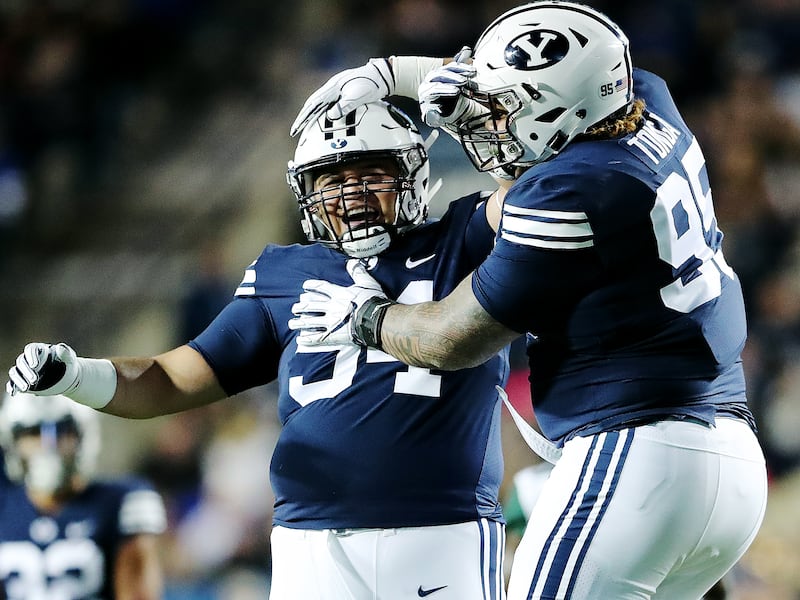At first glance, it appears BYU’s football team will be in a speck of trouble next season at the defensive line position after the Cougars in 2020 went 11-1 with one of the better defenses in program history.
All three of the Cougars’ starting defensive linemen from the magical season — nose tackle Khyiris Tonga and defensive ends Zac Dawe and Bracken El-Bakri — have announced recently that they won’t take advantage of the NCAA ruling last August that will grant student-athletes an additional year of eligibility due to the pandemic.
All three are pursuing the NFL, with the 6-foot-4, 321-pound Tonga the most likely to get drafted in late April or early May. Tonga is being represented by the DEC Management group and will play in the Hula Bowl on Jan. 31 at Aloha Stadium in Honolulu, Hawaii (outgoing BYU offensive lineman Tristen Hoge will also play in the Hula Bowl).
Dawe is scheduled to play in the College Gridiron Showcase in Fort Worth, Texas, this week, while El-Bakri played in the Spiral Tropical Bowl all-star game last week in front of 30 pro football scouts and was a member of the winning team.
Another senior defensive lineman on the 2020 roster, 6-4, 265-pound graduate student Uriah Leiataua, missed most of the season due to an undisclosed injury sustained in fall camp. Leiataua told the Deseret News in November before BYU honored 15 seniors that he plans to accept the NCAA blanket waiver and return to play in 2021.
The only other senior likely to return — on either side of the ball — is walk-on safety Jared Kapisi, as most Cougars feel they were able to get a full season in, having played 12 games, and are ready to move on.
So where does that leave BYU’s defensive line in 2021?
First, let’s start with the coaching. It’s no secret that head coach Kalani Sitake has two spots to fill after offensive coordinator Jeff Grimes and offensive line coach Eric Mateos left for similar openings at Baylor and will likely hire a defensive coach to even the staff at five coaches on offense and five on defense.
The front-runner for that defensive spot is Sitake’s longtime associate Kevin Clune, 48, a volunteer coach last season who accompanied the Cougars to Florida last month for the Boca Raton Bowl and was wearing a headset on the sidelines when Grimes and Mateos were unable to make the trip due to COVID-19 issues.
Clune most recently coached linebackers at Memphis but has known Sitake and new offensive coordinator Aaron Roderick since their days together on the coaching staff at Southern Utah (2003-04). Clune has been a defensive coordinator at Oregon State (2016-17) and Hawaii and was at Utah State for two separate stints and Weber State and Utah for one.
It wouldn’t be a surprise if Clune is assigned to work with BYU’s defensive line to free up Ilaisa Tuiaki to focus on his defensive coordinator responsibilities.
The biggest task will be to find a replacement for Tonga, who leaves as one of the top defensive linemen in program history, a four-year starter who had eight sacks and 130 tackles in his career.
One candidate to fill Tonga’s shoes is Atunaisa Mahe, a 6-1, 300-pound redshirt-sophomore from West Jordan who missed the entire 2020 season with an injury. Mahe showed flashes as Tonga’s backup in 2019, making two sacks, three tackles for loss and 22 tackles.
“Naisa has a lot of potential if he can stay healthy,” Tuiaki said.
Converted offensive lineman Caden Haws, a 6-2, 315-pound redshirt sophomore, backed up Tonga for most of 2020 and made 15 tackles, including three in the bowl win over UCF. Coaches have said that Haws, from Little Rock, Arkansas, and Mahe are two of the strongest players on the team.
BYU’s defensive ends were solid last year, with Dawe and El-Bakri getting the bulk of the starts and playing time, but struggled to consistently pressure quarterbacks. Granted, doing that was difficult when BYU employed its rush-three, drop-eight strategy against spread offenses.
The good news is that Leiataua has some untapped potential there; He was a big-time recruit for then-coach Bronco Mendenhall seven years ago before a church mission and several injury-plagued seasons.
Junior Lorenzo Fauatea, from Hunter High, can also play inside when BYU employs a 4-3 scheme. The 6-4, 305-pound tackle sustained a season-ending foot injury against UTSA last October.
As far as defensive ends go, freshman Tyler Batty showed great promise last season, making four sacks and 13 tackles in four games before sustaining an injury that would keep him out of games the remainder of the season.
Junior walk-on Gabe Summers played in all 12 games, usually backing up Dawe, and has earned scholarship consideration. The Westlake High product made 15 tackles in 2020.
Sophomore Seleti Fevaleaki of Corona, California, also became more of a factor as the season wore on, finishing with six tackles in 10 games. Rising senior Alden Tofa overcame an injury-plagued career to contribute in 2020 as well, and coaches say he can make an impact if he can stay healthy.
Other possible contributors include senior Earl Tuioti-Mariner of Topeka, Kansas, converted tight end Alema Pilimai and Andrew Slack, a two-sport star at Springville High.



